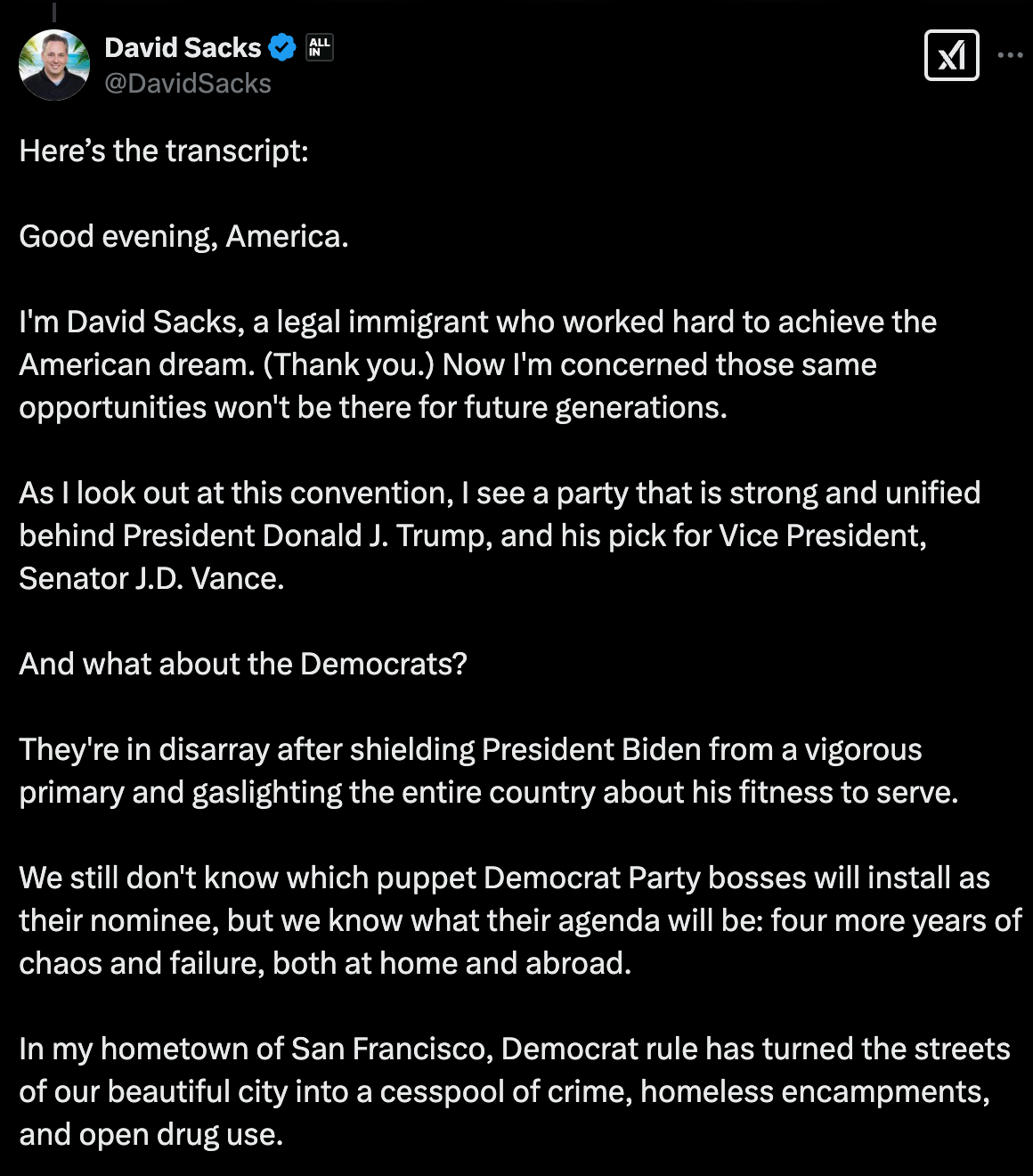TGIF Dispatchers.
In the gilded halls of Trump's post-inaugural celebrations, a figure stood out among the sea of politicos and tech titans.
David Sacks, the newly-minted AI and Crypto Czar, declared with characteristic boldness: "The war on crypto is over."
It was a stark reversal for someone who, just three years earlier, had denounced Trump as unfit for office after the attack on US Capitol Building on January 6, 2021.
But then again, Sacks has always had a knack for perfectly-timed pivots.
From South African immigrant to Silicon Valley kingmaker, Sacks' journey reads like a techno-political thriller.
Let’s dig in deeper.
Roses Are Red, Security Is Key
Trezor has transformed crypto security from a complex puzzle to a user-friendly playground, so you can be the boss of your financial future?
This Valentine’s Day, help your audience give a gift that lasts. Get discounts of up to 50% on Trezor’s bundled best-selling hardware wallets.
The Immigrant's Tale
David Oliver Sacks was born in Cape Town, South Africa, in 1972.
When he was five, his family emigrated to Tennessee, US, joining a wave of South African families seeking new opportunities abroad.
An immigrant in fledgling economy like US perhaps exposed Sacks in understanding of adaptation and reinvention. This duality would become a defining feature of David's approach to both business and politics.
His academic journey took him from Tennessee to Stanford University, where he earned his economics degree. He went on to pursue law at the University of Chicago Law School. Chicago's famous free-market economics department left an indelible mark on Sacks' thinking.
The combination of law and economics gave him a unique lens to view the intersection of regulation and innovation.
While many know Sacks as the tech mogul or political operative, his personal life tells a different story.
His 2007 marriage to Jacqueline Tortorice marked the beginning of a partnership that would ground his ambitious pursuits.
Jacqueline, herself an entrepreneur who founded the wellness-focused clothing brand Saint Haven, shares his drive for innovation but in a different domain.
Together, they've built more than just business empires.
Their Pacific Heights mansion has become home to three children – two daughters and a son.
The PayPal Years
When Sacks walked into PayPal's offices in 1999, he couldn't have known he was stepping into tech history.
As the Chief Operating Officer, Sacks was helping forge a new model of entrepreneurship alongside Elon Musk and Peter Thiel.
The "PayPal Mafia," as this group would later be known, wasn't just about business success. It was a crucible where ideas about technology, liberty, and the future of finance were tested and refined.
For Sacks, it was also where he learned the art of the pivot – how to turn technical innovation into market dominance.
The relationship between David Sacks and Elon Musk resembled something out of a Silicon Valley fairy tale - two South African immigrants who transformed themselves into American tech titans.
While Musk shot rockets into space and built electric cars, Sacks was quietly building an empire of his own.
Through Craft Ventures, he became one of SpaceX's early investors, turning his PayPal windfall into a stake in humanity's interplanetary future.
Get 17% discount on our annual plans and access our weekly premium features (HashedIn, Wormhole, Rabbit hole and Mempool) and subscribers only posts.
Evolution of a Tech Democrat
The Crypto and AI Czar was not always a Trump supporter.
In fact, in January 2021, Sacks wasn't just critical of Trump - he was leading Silicon Valley's charge against the Capitol riot.
CNN found at least 20 now-deleted tweets where Sacks slammed Trump's actions.
David Sacks (January 2021)
"What Trump did was absolutely outrageous. And I think it brought him to an ignominious end in American politics. He will pay for it in the history books, if not in a court of law."
His deleted tweets reveal a deeper story.
"Speech can be regulated under the First Amendment in ways that would have taken down the most incendiary tweets of Trump and the other rabble-rousers," Sacks wrote in January 2021.
He even criticised those pushing election fraud theories: "It's always easier to invent conspiracy theories than to accept defeat. We shouldn't let them get away w/ that."
Yet by 2024, something had changed.
The Trump Transformation
The story of how Sacks went from Trump critic to Trump confidant is a masterclass in political realignment.
What changed? By Sacks' own account in his June 2024 endorsement on X: "The voters have experienced four years of President Trump and four years of President Biden. In tech, we call this an A/B test."
His pivot wasn't subtle.
After hosting fundraisers for DeSantis and donating over $1 million to Republicans in 2022, Sacks threw his full weight behind Trump.
The culmination? A $12 million fundraiser at his San Francisco home that paved his path to Washington DC.
His path to Trump’s internal power corridors wasn't just about political donations. His long-standing relationship with fellow PayPal alumnus Elon Musk proved crucial.
The All-In podcast, which he co-hosts with fellow tech investors, became required listening in Silicon Valley.
It was here that Sacks began articulating his vision for a less regulated, more technologically-driven future – a vision that would later align perfectly with Trump's anti-establishment message.
But politics, like markets, is about timing.
When Musk secured his position as head of the new Department of Government Efficiency (DOGE), Sacks' appointment as crypto czar seemed almost predetermined.
How? As Biden's US Securities and Exchange Commission (SEC) waged war on crypto, Sacks saw an opportunity.
His $12 million fundraiser for Trump was about positioning himself as the bridge between Silicon Valley and MAGA.
The strategy worked brilliantly.
By December 2024, Sacks wasn't just in the Trump administration; he was architecting its entire approach to digital assets and artificial intelligence. At least that was the plan.
Read: Crypto's Dream Regulator ✨
America's Digital Future Via Sacks’ Lens
On February 4, 2025, David Sacks stood at a podium in Washington, flanked by Republican heavyweights, and laid out his vision for America's crypto future.
Sacks' first priority was clear: stablecoins.
Not the offshore variety that dominate today's market, but American-issued, dollar-backed digital assets that could extend US financial dominance into the crypto age.
"The stablecoin market has already taken off but mostly offshore," Sacks told CNBC after the press conference. "We want to bring that innovation onshore."
Read: Crypto Czar Hits Regulatory Reset 🔄
Sacks' ambitions don't stop at stablecoins.
Under his guidance, the administration is seriously exploring the creation of a US Bitcoin strategic reserve.
Read: Can Bitcoin Reserve Be the Magic Pill? 🏛️
Reality Check: The Scaled-Back Czar
But the "czar" title comes with fine print.
Sacks' role has been quietly scaled back to more of an advisory position.
The reason? Sacks isn't divesting from his venture firm, Craft Ventures, and doesn't want to become a full-time government employee.
Instead, he'll split time between DC and Silicon Valley as a "special government employee" - a designation that allows him to maintain his private sector interests.
"I expect to spend 50% of my time in D.C. guiding policy and 50% in Silicon Valley staying on the cutting edge. This seems ideal for a tech policy role —and it's exactly what I requested," Sacks said on X.
Silicon Valley’s Link to DC
For Silicon Valley, having Sacks in Washington - even in a reduced role - represents a familiar face in unfamiliar territory. His venture capital background and tech industry connections make him a natural translator between two worlds that often struggle to understand each other.
Even in this constrained role, Sacks is already making waves. His recent clash with Chinese AI firm DeepSeek shows how he might bridge Silicon Valley's interests with national security concerns.
"There's substantial evidence that DeepSeek distilled knowledge from OpenAI's models," Sacks claimed on Fox, championing American tech innovation while raising alarm about foreign competition - a perfect blend of Silicon Valley interests and MAGA priorities.
Sacks is also using his 50% time to assemble an advisory council that reads like a who's who of crypto power players: Ripple's Brad Garlinghouse, Circle's Jeremy Allaire, and Coinbase's Brian Armstrong are all potential members.
"Everyone and their mother is begging to be on this council," one insider revealed to the press. The reason is clear: this group will help shape the rules of digital finance for years to come.
Token Dispatch View 🔍
Sacks' ascension to crypto czar is a pivotal moment in American financial history. Through his combination of technological expertise, political savvy, and market understanding, he's been put in a position that allows him to influence, if not reshape, how America approaches digital assets.
Sacks has already declared NFTs and memecoins to be "collectibles" rather than securities – a classification that could dramatically reduce regulatory burden on these assets.
It's a prime example of his light-touch approach to regulation, aimed at fostering innovation rather than constraining it.
There's a certain paradox here, though.
An anti-establishment tech figure becoming the establishment's gatekeeper. Sacks' rise from a Trump critic to a position of power might sound too good to be true. What can’t be refuted though is that his new chair at DC puts him in a unique position to work on Silicon Valley's relationship with power.
Sacks is already wielding his influence - by positioning American tech interests against Chinese competitors like DeepSeek. It's a strategy that aligns perfectly with both Silicon Valley's commercial interests and MAGA's nationalist agenda. But it also highlights the tension between crypto's borderless ideals and the reality of nation-state competition.
His "special government employee" status might make him a more effective bridge between tech and DC, or it might limit his ability to drive real change. The arrangement feels uniquely Silicon Valley - trying to disrupt Washington while hedging your bets.
Sacks' effectiveness will be measured by his ability to navigate all these contradictions and successfully bridge Silicon Valley and Washington to help mainstream crypto's adoption.
For better or worse, Sacks may have distinctly cut out powers to shape America's digital future.
Token Dispatch is a daily crypto newsletter handpicked and crafted with love by human bots. You can find all about us here 🙌
If you want to reach out to 200,000+ subscriber community of the Token Dispatch, you can explore the partnership opportunities with us.
Disclaimer: This newsletter contains sponsored content and affiliate links. All sponsored content is clearly marked. Opinions expressed by sponsors or in sponsored content are their own and do not necessarily reflect the views of this newsletter or its authors. We may receive compensation from featured products/services. Content is for informational purposes only, not financial advice. Trading crypto involves substantial risk - your capital is at risk. Do your own research.











